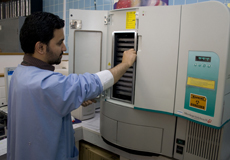Microbiology

More than 400,000 tests are performed annually in the various sub-sections of Microbiology: Bacteriology, Virology, AFB-Mycology, Parasitology, and Environmental. Additionally over 300,000 samples are processed at the urinalysis section.The section employs 35 Medical Technologists, half of whom are Saudi nationals, one Receptionist, one Supervisor, one Clinical Scientist and two Consultant Microbiologists.
The section is equipped with a Level III Containment Laboratory, which is used for processing blood cultures/TB and investigations of special pathogens such as agents of anthrax, plague and tularemia. The laboratory is equipped with State of the Art semi-automated systems to monitor routine blood culture and for pathogens identification
Acid Fast Bacilli (AFB) or Mycobacteriology
Tuberculosis remains a highly prevalent infection in the region. The vast majority of specimens processed at our laboratory are of respiratory origin. With the introduction of an automated broth culture system ten years ago, time to detection of M. tuberculosis has been reduced from many weeks to 5-10 days. Isolates from newly diagnosed patients are tested on-site for susceptibility to first line anti-tuberculosis drugs. Molecular methods are available for direct detection of M. tuberculosis as well as detection of M. Tuberculosis from culture specimens. Recently, INNO-LiPA MYCOBACTERIA v2; introduced to our laboratory and under validation. INNO-LiPA is a line probe assay for the simultaneous detection and identification of the genus Mycobacterium and 16 different mycobacterial species. The test is based on the nucleotide differences in the 16S-23S rRNA spacer region and can be performed starting from either liquid or solid culture.
Bacteriology:
All specimens for routine bacteriology are analyzed in this section, Making the microbiology laboratory a reference for many laboratories in the region, with no send out samples. Methods employed are manual and semi-automated with increasing supplementation by automated systems for gram staining, culture control and Microbial identification with antimicrobial susceptibility testing. Microbiology laboratory Monitor the trends of increasing Drug-Resistance-Pathogens and implement it’s part in the Antimicrobial Stewardship Program, with continuous collaboration and reporting to Infection Prevention and Control Department.
Environmental Testing:
Tests to support Dialysis and Central Service are performed in this section. The environmental lab also analyzes water for threshold bacterial contamination levels. Antibiotic moist organism such as MRSA, VRE and Acinetobacter bumanni are performed here. We also test Air Samples for fungal and bacterial pathogens. These tests are for clinical programs, in particular Infection Control investigations.
Mycology:
Specimens for diagnosis of superficial and systemic mycosis steadily increase in the number due to increase immunocompromised inpatients Since introduction of Stem Cell Transplantation program, new tests has been introduced to target pathogenic fungi specific for this population. We currently validating Galactomannan assay to detect invasive aspergillosis and DFA for diagnosis of PCP (Pneumocystis jiroveci pneumonia)
We consider leaders in performing antifungal susceptibility testing against 9 antifungal agents using Broth Micro dilution assay (SensiTitre)
Parasitology:
In this section, all stool samples undergo Direct Wet Smear or concentrated smear, as well as Trichrome stained. There are Rapid EIA kits for Cryptosporidium and Giardia. And multiple advanced Dissecting microscopes for Arthropods Identifications.